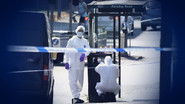
Telegram and the Russian Billionaire
Telegram is the fifth most downloaded app on the planet, with almost a billion users worldwide. More than six million people in the UK have it on their phones, but the social media platform is also popular with criminals and extremists. Telegram has been called a one-stop shop for crime and now its billionaire owner is under investigation by French police. They have accused Pavel Durov of complicity in drug dealing, fraud and the sharing of child sexual abuse images on Telegram. Reporter Bronagh Munro investigates how the app can spread harmful and dangerous content.
Country: GB
Language: En
Runtime: 30
Season 72:

Only one in 20 crimes in England and Wales result in someone being charged. More criminals are now getting away with everything from burglary to knife crime. So, is the public being let down by the system? Reporter Bronagh Munro meets the victims left to investigate their own crimes and goes on the trail of the criminals who have escaped justice.

A new generation of anti-obesity drugs are being hailed as game changers for the NHS and for millions of patients. So-called 'skinny jabs' like Wegovy have largely been the preserve of celebrities and those with the money to buy them privately, but now the NHS is beginning to roll them out. So will they live up to the hype, how available will they be, and is the NHS ready for a revolution in treating obesity?

Panorama investigates the state of many of Britain’s school buildings, meeting the headteachers struggling to keep children safe in their classrooms and hearing from children learning in gloves due to extreme cold. Reporter Rahil Sheikh visits schools during the harsh winter months, discovering that recent concerns over crumbling concrete are just the tip of the iceberg. Figures from the National Audit Office show that more than £11 billion is needed for repairs, with 700,000 children currently learning in substandard schools.

Panorama investigates the crisis in maternity care that is putting women and babies at risk. Whistle-blowers at a trust in Gloucestershire tell reporter Michael Buchanan about the deaths of mothers and babies, the dangers of understaffing and a culture that they say has failed to learn from mistakes. The regulator, the Care Quality Commission, has said that maternity services at the trust are inadequate and Panorama has calculated that maternal deaths there are almost double the national average. The trust says that it's deeply sorry for failings in its care and that it's made improvements to its maternity services.

It's a parent's nightmare. An apparently healthy child dying without warning, and no explanation of what went wrong. Yet unexplained deaths in children over a year old happen almost once a week in the UK. They sometimes result in parents being falsely accused of harming their child. Reporter Richard Bilton investigates these sudden unexplained deaths in children and looks at the research trying to find out why they happen.

Fergus Walsh follows patients with Alzheimer's disease, who have been taking two new drugs that have been shown to slow down its progression. Is this a turning point in its treatment?

Following the attacks of 7 October 2023, Israel has vowed to destroy Hamas. But can it? John Ware investigates Hamas’ network outside Gaza, uncovering a web of financial enablers.

As the Post Office scandal continues to make the headlines, Panorama investigates the UK’s other great postal institution, Royal Mail. Millions of us rely on letters for hospital appointments, tax returns and legal documents, but as reporter Zoe Conway discovers, Royal Mail is not always delivering. Last year, it was fined more than £5 million for missing targets. Panorama hears from whistleblowers and senior management, who believe the postal system must change if Royal Mail is to survive. Is it the last post for the letter?

Justin Webb and Marianna Spring travel from the frozen plains of Iowa to the swing state of Georgia to explore Donald Trump’s enduring appeal and look ahead to an unprecedented American election year.

Hundreds of thousands of people own mobile homes and caravans in the UK, but some discover they don’t have the right to call them home. Reporter Rory Carson meets the caravan park residents who say they have been mis-sold their properties and falsely promised they could stay in them for the rest of their lives. And he investigates the site owners who have been accused of cheating people out of their life savings.

Filmed over five months inside a council on the verge of bankruptcy, Panorama explores why many town halls across the UK are in financial crisis. Reporter Alison Holt follows councillors and officials as they make decisions on which services to cut and which to charge more for in Havering, a London borough facing a £50 million deficit.

Over the past couple of years, net migration to the UK has hit record levels. So how has that happened, when the government promised in the wake of Brexit that immigration would be lower? Ros Atkins crunches the numbers and explores the political choices behind them. He meets the people running businesses who say they need immigration, and those who say the UK can’t sustain the current numbers.

Panorama investigates a private hospital chain being used to help clear the NHS waiting list. With more than six million people in England alone waiting for an operation on the NHS, Monika Plaha investigates the safety record of one of the UK's biggest private healthcare providers. Private hospitals can offer a quick and safe solution to patients who may be in pain and facing long NHS waits, but what happens if things go wrong? Most private hospitals lack intensive care facilities and rely on the NHS if patients develop complications. We look at the warnings received by one hospital where two patients died after waiting for transfer, only for a third person to die after a 14-hour wait to get them to NHS emergency facilities just one mile down the road.

The rollout of smart motorways has been stopped because of safety fears, but there are still 250 miles of the network with no hard shoulder. The government says new technology will make existing stretches of smart motorways safe. But what happens when the technology doesn’t work? Panorama reveals how equipment failure and power cuts can leave motorists in danger if they break down. When the system isn’t working, the cameras won’t see you, the radar won’t find you and you’ll have no idea the motorway isn’t smart anymore. Reporter Richard Bilton meets the people whose lives have been changed by the roads that keep failing.

Many brands say they are doing their bit for the environment, even big polluters like tech, energy, and airlines. Now, Panorama investigates the green projects that say they can help brands cancel out their carbon emissions. But do the claims stack up? The programme visits several environmental projects and uncovers evidence of sexual harassment, raises questions about how money is spent and reveals how part of a protected rainforest is being destroyed by major construction work.

For years, they trafficked huge quantities of drugs and threatened anyone who stood in their way. Now most of the gangsters who ran the Huyton Firm are behind bars after 10,000 of their secret messages were decrypted and used as evidence in court. The messages reveal the brutal reality of organised crime as never before. They show how the Liverpool mobsters ordered shootings and hand grenade attacks, while boasting of their own sickening crimes. Reporter Bronagh Munro investigates the crime bosses who terrorised a city.

Between 1970 and the early 1990s more than 30,000 people in the UK were infected with HIV and Hepatitis C through contaminated blood products and transfusions. It has been described as the worst treatment disaster in NHS history. Since then, around 3,000 of those infected have died, but many of their relatives have yet to receive any compensation. A public inquiry opened in 2018 to discover what really happened, and in May it will deliver its final report. Reporter Jim Reed meets the families of some of the 380 children with bleeding disorders who were infected with HIV and talks to them about what they have lost, their campaign for justice, and what they hope for from the inquiry.

Panorama goes undercover in the Probation Service and reveals how easy it is for convicted criminals to go on the run, that drug tests are not being carried out because they are too expensive, and that staff are failing to carry out regular room searches. The Probation Service is supposed to help keep the public safe and reduce reoffending when criminals are released from prison, but Panorama reveals a system described by staff as broken. The programme hears from families whose loved ones have been murdered by offenders on probation and reveals new figures for serious crimes, including rape and murder, committed by those on probation.

Ruja Ignatova, the flamboyant founder of fake cryptocurrency OneCoin, is the world's most wanted woman. Dubbed the 'Missing Cryptoqueen', she's on the FBI's Ten Most Wanted Fugitives list after defrauding investors of USD4.5 billion and then vanishing. Panorama investigates her close ties to a suspected Bulgarian organised crime boss and allegations that she was brutally murdered. The programme has exclusive access to the US special agent in charged of tracking Ignatova down and follows a brave Bulgarian journalist who has faced death treats, trying to get to the truth. Did the 'Missing Cryptoqueen' run with the money, or was she killed by the very people that were supposed to protect her?

Panorama investigates a school for children with special educational needs. Places at LIFE school in the Wirral cost the local authority £50,000 or more a year per pupil, but reporter Sasha Hinde sees little teaching going on. Instead, pupils are mocked, bullied and physically abused. Undercover filming reveals how children with ADHD, autism and complex needs are placed in headlocks or wrestled to the ground by staff and described as 'thick' and 'retards'. The school says it has an excellent academic record, takes any allegation of misconduct or inappropriate behaviour extremely seriously and that some members of staff have been suspended. Parents tell Panorama they feel let down and believe the school should be closed.

From tooth decay to obesity, our children’s health is in decline, and it’s storing up trouble for the future. Keir Starmer has promised his new government will tackle it, but that won’t be easy or cheap. Reporter Rahil Sheikh goes back to Sheffield, the city where he was born, to discover what’s causing the crisis and what can be done to fix it.

Labour is back in power with a big majority and some big promises. The new government says it will fix the NHS, grow the economy and build thousands of new homes, but right now money is tight. There are also challenges abroad as war continues in Ukraine and the Middle East. With behind-the-scenes access to the new chancellor Rachel Reeves and key cabinet players, Laura Kuenssberg follows Labour’s first days in office. They say the country is broken, so can they fix it?

In June 2023, Barnaby Webber, Grace O'Malley-Kumar and Ian Coates were stabbed to death by Valdo Calocane. Reporter Navtej Johal investigates his history of mental ill health, the care he received in the three years before the Nottingham attacks and asks what lessons can be learned. Speaking for the first time to BBC Panorama, members of the Calocane family help to shed light on the missed opportunities in his care.

A knife attack on a Taylor Swift dance workshop in Southport left three children dead and eight others seriously injured. The killings then sparked the worst rioting on our streets for more than a decade. Police, mosques and hotels housing asylum seekers were targeted. Terrified residents were barricaded in their homes. The violence was stoked by far-right activists and fuelled by lies and disinformation online. Darragh MacIntyre reports from some of the worst affected towns and cities and asks what can be done to prevent such violence from happening again.

What happens when smartphones are taken away from kids for a week? With the help of two families and lots of remote cameras, Panorama finds out. Do they talk to their parents more, sleep better, or miss out on vital conversations with friends and the chance to discover something new? With calls for smartphones to be banned for children, Marianna Spring speaks to parents, teenagers and social media company insiders to investigate whether the content pushed to their feeds is harming them.

Controversial influencer Andrew Tate and his brother Tristan already face charges in Romania of human trafficking and organised crime. Now prosecutors there have launched a fresh investigation, including into an allegation against Andrew Tate of having sex with a minor. Film-maker Oana Marocico returns to her home country to investigate the Tates’ Romanian webcam business and speaks to women who claim they’ve been abused by the brothers.

HS2 was meant to be the railway of the future, an epic piece of engineering which would get Britain moving and help level up. But more than a decade on, the costs have rocketed, key sections of the line have been scrapped, and the project is mired in uncertainty. Richard Bilton investigates what went wrong, talking to politicians, whistle-blowers and people living along the route, to discover how billions of pounds of taxpayers' money was blown.

As the cost-of-living squeeze continues to affect many, supermarkets say they’re doing what they can to help us save money, offering discounts and promotions. But just how good are these deals? Michelle Ackerley investigates whether some supermarkets are being good to their word, with claims of matching the prices of discounters like Aldi and packaging that seems to disguise the true size of goods. She reveals how some dog food hasn’t got much meat in it, some coconut milk has little coconut in it, and some chicken nuggets don’t have much chicken in them at all.

Kirsty Wark investigates the multi-billion-pound global menopause industry. It promises women relief from often debilitating symptoms if they buy specially branded supplements, teas and even pyjamas. Researchers from the Centre for Evidence-Based Medicine in Oxford put some of the scientific claims behind these products under the microscope. While many women struggle to access the support they need through the NHS, a growing number are choosing to seek help privately. Panorama examines the prescribing practices at an online clinic run by one of the world’s most successful menopause specialists and hears from former patients who feel they were not properly informed of the risks of treatment.

When Hamas attacked Israel on 7 October 2023, it led to a war that threatens to engulf the entire region 12 months later. Jane Corbin has been following four families, two in Israel and two in Gaza, whose lives have been changed forever by the conflict. Tens of thousands of Gazans are reported to have been killed and much of the territory has been reduced to rubble. With many Israeli hostages having died in captivity, dozens more still being held by Hamas and violence now spreading to Lebanon, a deal to bring peace looks as far away as ever.

Revolut is a UK business success story. Founded almost a decade ago and offering online payments and foreign currency services, it’s expanded rapidly and is now valued at around £35 billion. Revolut was granted a provisional banking licence in the summer of 2024, but it’s also the financial ombudsman’s most-complained-about financial institution for fraud. Reporter Catrin Nye investigates the stories of Revolut customers who say scammers took tens of thousands of pounds from their accounts and that Revolut failed to protect them. Revolut says it takes fraud ‘incredibly seriously’ and that it has invested heavily in both detecting fraudulent activity and preventing its customers from being embezzled.

Former nurse Lucy Letby became one of the UK’s most notorious child killers after she was convicted of harming and murdering babies in her care. The nurse was found guilty by two juries after lengthy trials, but now a growing number of experts are questioning the prosecution's evidence. Reporter Judith Moritz, who has covered the case from the start, investigates the questions that have been raised about Lucy Letby’s conviction.

For the past two years, Panorama has been following some of Donald Trump’s most ardent supporters. One was just feet away from the former president when a gunman tried to assassinate him during a rally in Pennsylvania. They tell Panorama why they want Trump, now a convicted felon, to get a second chance in the White House, while experts analyse his continued appeal. With the election on a knife-edge, and the former president facing more criminal charges, never before, and likely never again, will a candidate fight a presidential campaign whilst also fighting to stay out of prison.

With exclusive access to the parents of Chris Kaba, who was shot dead by armed police, Panorama investigates what happened on the night of the fatal shooting. Reporter Greg McKenzie speaks to insiders from the Met and the Independent Office for Police Conduct, which provided evidence used to charge firearms officer Martyn Blake with murder. In the wake of the not guilty verdict, Panorama asks what’s next for the Kaba family, Martyn Blake and the Metropolitan Police.

Smart meters are supposed to make paying our energy bills easier and cheaper. But is that the whole story? In 2011, the coalition government set out plans to get smart meters into every home and said it could complete the rollout by 2019. But years later, only two-thirds of homes have one, and millions of smart meters don't work as they should. Zoe Conway investigates why there are so many problems that leave customers frustrated and out of pocket – and reveals how well your smart meter works can depend on where you live.

Richard Bilton meets the scientists trying to save the world from the consequences of climate change and investigates whether they can really make a difference.

Alcohol-related deaths from liver disease among women under 40 have risen sharply over the last decade – but why? Thirty-two-year old BBC journalist Hazel Martin goes on a personal journey to find the answer. She is one of a growing number of young women who have experienced alcohol-related liver damage, despite not regarding herself as being dependent on alcohol. Talking to doctors, patients and experts on the drinks industry, Hazel discovers that a key cause is Britain’s binge-drinking culture and explores what can be done about it.

Tomatoes are a store cupboard staple for many of us, but can we trust what we are eating? Reporting for Panorama, Runako Celina investigates what is in the tomato purees we buy to make pizzas, pasta sauces and much more besides. She follows the tomato trail from China to Italy and then on to the UK and asks if products made using forced Uyghur labour in the Chinese province of Xinjiang could be ending up on the shelves of some of the UK’s biggest supermarkets.

It looks like England’s most successful water company, Severn Trent, is popular with investors. It has been awarded the Environment Agency’s top rating for five consecutive years, but is the company’s record really as good as it appears? Reporter Joe Crowley investigates how Severn Trent hits environmental targets while dumping large quantities of sewage and asks whether there is more to the company’s finances than meets the eye.

Telegram is the fifth most downloaded app on the planet, with almost a billion users worldwide. More than six million people in the UK have it on their phones, but the social media platform is also popular with criminals and extremists. Telegram has been called a one-stop shop for crime and now its billionaire owner is under investigation by French police. They have accused Pavel Durov of complicity in drug dealing, fraud and the sharing of child sexual abuse images on Telegram. Reporter Bronagh Munro investigates how the app can spread harmful and dangerous content.

